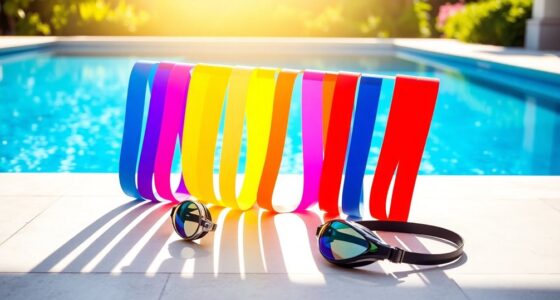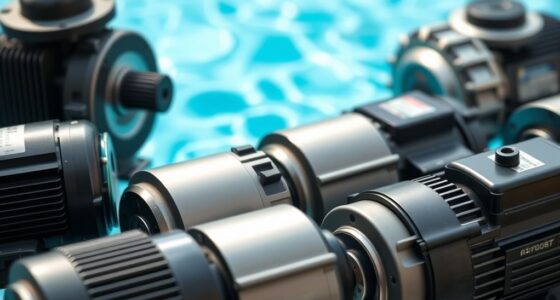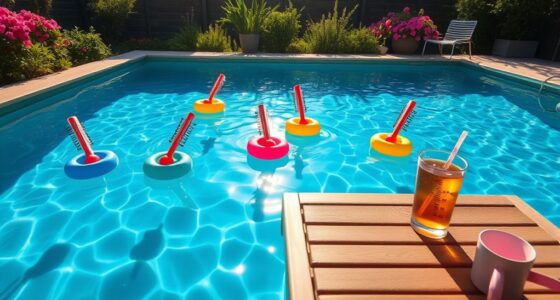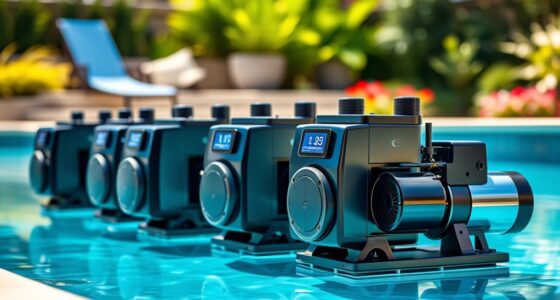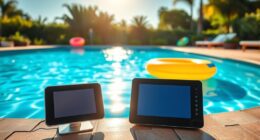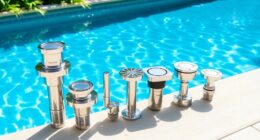Pool chemicals like chlorine and algaecides are essential for keeping your water safe. Chlorine disinfects by killing harmful bacteria and viruses, while algaecides prevent algae growth, ensuring clear water. pH balance is vital for effective sanitation—if it’s off, chlorine can’t work properly. Using stabilizers protects chlorine from sun degradation, and regular shock treatments eliminate contaminants. Proper handling of these chemicals is necessary for safety. Discover more ways these products contribute to your pool’s health and maintenance.
Key Takeaways
- Chlorine disinfects pool water by killing harmful bacteria, viruses, and microorganisms, ensuring a safe swimming environment.
- Maintaining proper pH levels is crucial for chlorine efficiency and prevents skin and eye irritations.
- Algaecides are used to inhibit algae growth, keeping water clear and preventing it from turning green.
- Stabilizers protect chlorine from sun degradation, allowing it to remain effective longer in maintaining clean water.
- Regular shock treatments eliminate contaminants and chloramines, contributing to overall water cleanliness and safety.
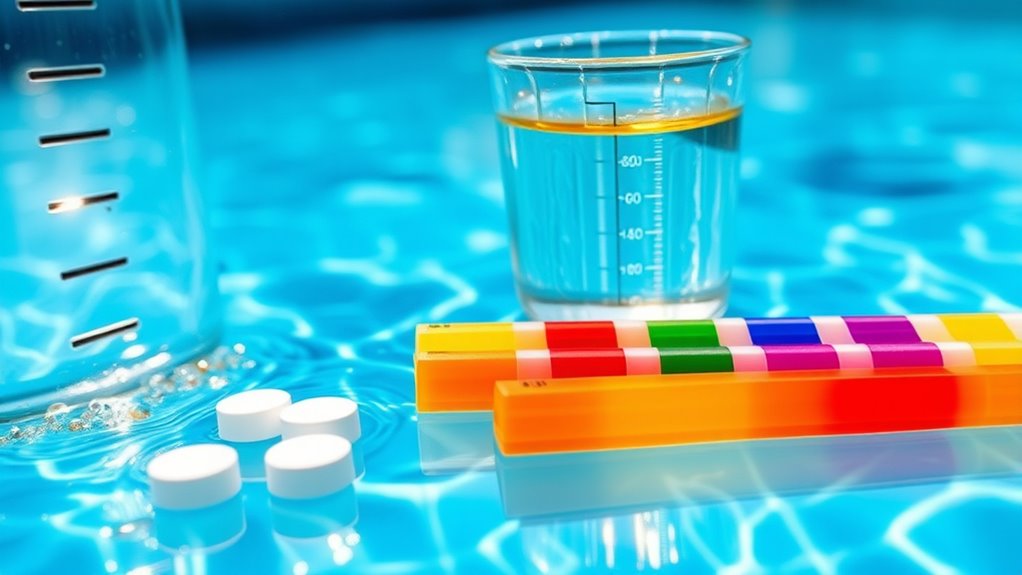
When it comes to keeping your pool safe and inviting, understanding the role of pool chemicals is fundamental. Chlorine plays an essential role in this process, forming hypochlorous acid, a powerful disinfectant that effectively kills bacteria, viruses, and other harmful microorganisms lurking in your pool water. This doesn’t just keep your pool clean; it guarantees a safe swimming experience for you and your guests.
Beyond just disinfection, pool chemicals help balance pH levels, which is critical for effective sanitation and swimmer comfort. If the pH isn’t in the right range, chlorine can’t do its job properly, leading to potential health risks like skin and eye irritation. Regular testing of these levels is necessary to maintain the ideal balance. Additionally, using muriatic acid can help you adjust pH levels when they stray too far from the perfect range.
Algae growth is another challenge that pool owners face. To combat this, algaecides are employed, preventing your pool from turning green and keeping the water clear and safe. You’ll also want to use stabilizers to protect chlorine from degrading in sunlight, making certain it remains effective. Shock treatments are recommended periodically as well, oxidizing accumulated contaminants and chloramines, guaranteeing your water stays clean and inviting.
While these chemicals are fundamental for maintaining a safe pool, handling them requires caution due to potential health risks. Always wear personal protective equipment like gloves and safety glasses when dealing with pool chemicals. Store them in well-ventilated areas away from heat sources to prevent fires. If you experience a chemical spill, cleanup should happen immediately to minimize exposure and accidents.
It’s important to remember that improper handling can lead to skin irritations, respiratory issues, and even chemical burns. Chronic exposure can pose health risks not only to you but also to frequent swimmers and pool workers. As a result, regular hygiene practices are critical to avoid any negative effects.
Frequently Asked Questions
How Often Should I Test My Pool Water?
You should test your pool water regularly to keep it safe and clean.
If you use your pool heavily, aim for 2-3 tests per week for chlorine and pH levels, while checking total alkalinity weekly.
For calcium hardness, a monthly test works well.
Don’t forget to adjust your testing frequency based on weather conditions and pool parties, as these can impact water quality considerably.
Consistent testing helps prevent costly issues down the line.
Can I Use Household Chemicals in My Pool?
You shouldn’t use household chemicals in your pool.
They’re not designed for that purpose and can lead to dangerous chemical reactions.
These products often lack the necessary sanitizing power, which means they won’t keep your water safe.
Instead, stick to specialized pool chemicals that are formulated to maintain water quality.
If you’re unsure, consult a pool professional to guarantee you’re using the right products for a safe swimming environment.
What Is the Ideal Ph Level for Pool Water?
You might think that a slight pH shift doesn’t matter, but it can make a world of difference.
The ideal pH level for your pool water sits between 7.4 and 7.6. Staying within this range keeps bathers comfortable and protects your equipment.
If your pH strays too far, you risk skin irritation and cloudy water.
Regular testing guarantees you maintain that balance, safeguarding both your pool and your swimming experience.
Are Pool Chemicals Safe for Pets and Children?
When it comes to pool chemicals, safety for pets and children is vital. You should always supervise them near the pool and make certain chemicals are properly diluted.
Concentrated chemicals can be dangerous, causing severe health issues if ingested or if they come into contact with skin. Store pool chemicals securely and educate your family about the risks.
How Do I Store Pool Chemicals Safely?
Storing pool chemicals is like keeping a secret recipe—everything needs to be just right.
To store your chemicals safely, keep them in a cool, dry place below 95°F, away from sunlight. Use original containers, label them clearly, and make certain they’re tightly closed.
Maintain good ventilation and separate incompatible chemicals. Always check for leaks or damage.
Ultimately, keep them locked away from kids and pets, just like you’d with your favorite ingredients!
Conclusion
In conclusion, using pool chemicals is essential for keeping your water safe and enjoyable. Did you know that properly maintained pool water can reduce the risk of waterborne illnesses by up to 80%? By regularly testing and adjusting your chemical levels, you guarantee a clean swimming environment for you and your loved ones. So, don’t overlook those chemicals—your health and safety depend on it! Immerse yourself with peace of mind knowing you’re protecting your pool experience.

